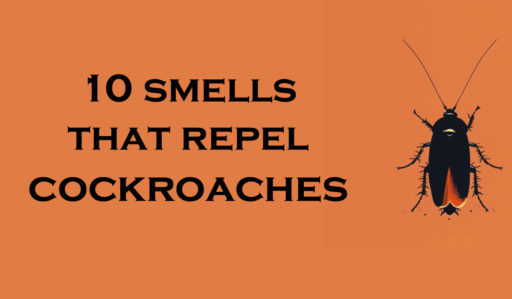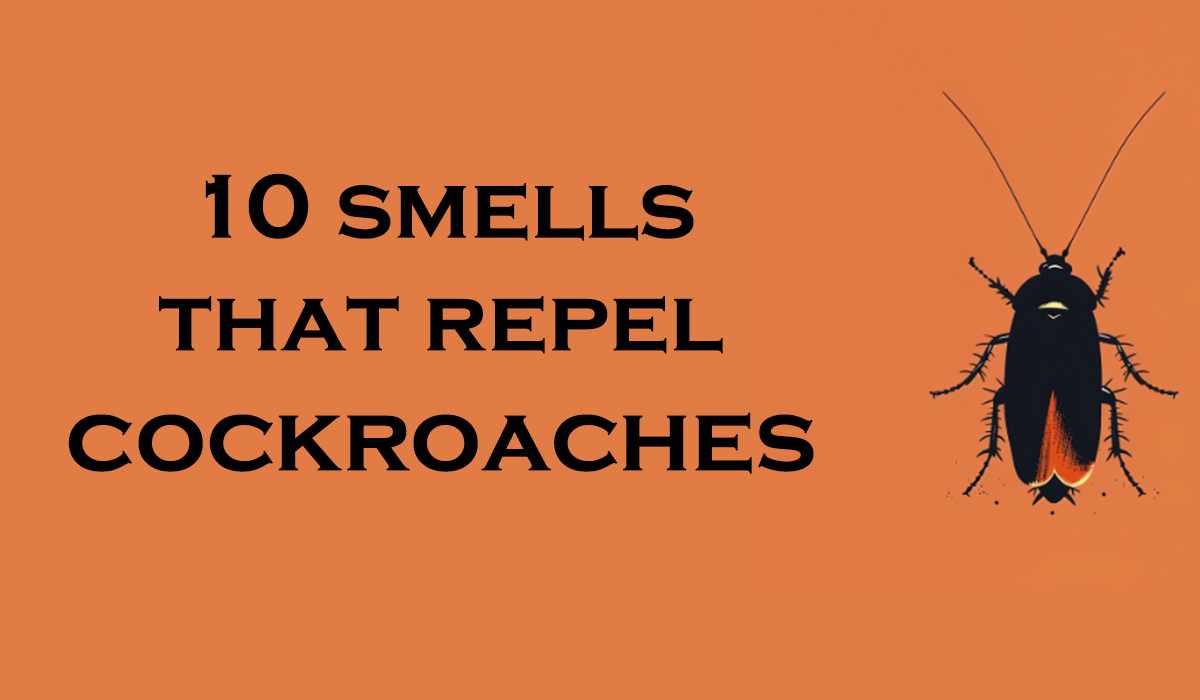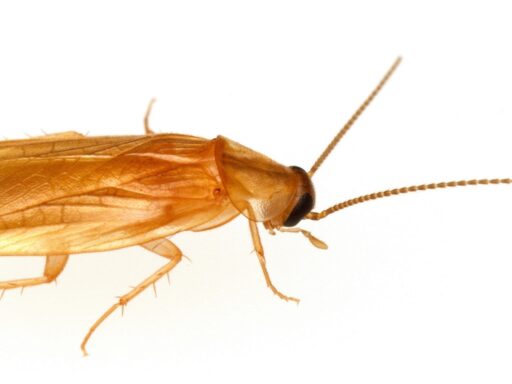Picture this: You’re enjoying a midnight snack, and out of the corner of your eye, something scuttles across the floor… It’s a cockroach. Ugh! These unwelcome guests are the worst, and getting rid of them can feel like a never-ending battle. Hold on, though! Before you reach for those harsh chemical sprays, what if you could send those roaches packing with scents you might already have in your home?
Do Smells Repel Cockroaches?
Yes, but with a few caveats. Cockroaches have an incredibly powerful sense of smell. They use it to find food, navigate their world, and even communicate. So, when they sniff out something unpleasant, their instinct is to head the other way.
However, roaches are also survivors. A strong smell might send them scurrying temporarily, but if they’re starving, they might brave anything for a meal. That’s why using smells to deter roaches works best as part of a multi-pronged approach:
- Keep it clean: No amount of nice smells will make up for a messy kitchen.
- Seal it up: Block any possible entry points with caulk or other sealants.
- Strong Scents = Strong Defense: Now’s the time to break out those powerful odors!
Let’s dive into the science behind scents and roaches, shall we?
The Science of Scent and Roaches
Cockroaches might not have noses, but that doesn’t mean they can’t smell. They use their antennae like super-powered scent detectors! These antennae are covered in tiny receptors that pick up on all sorts of chemical signals in the air. Think of it like they’re constantly sniffing out clues to find their next meal or a safe hiding spot.
When a cockroach detects a smell it finds repulsive, it triggers a “NOPE!” reaction in their little roach brain. They’ll try to move away from the source as quickly as possible. But, as we mentioned earlier, cockroaches are resilient. If a smell is mildly annoying, but they’re desperate, they might just power through to get to the good stuff.
That’s why it’s important to hit them with powerful and persistent scents to really make them think twice about invading your space.
Okay, enough science… let’s get to the good part – the scents that actually work!
What Smells Can Repel?
The best part about using scents to combat cockroaches is that you might have some of these natural repellents right in your kitchen! From the refreshing zing of citrus to the pungent punch of garlic, there’s a whole arsenal of aromas that roaches despise.
Of course, some scents are more effective than others. Essential oils often pack a powerful punch, as they’re highly concentrated versions of those plant-based smells.
Ready to transform your home into a roach-free zone? Let’s break down the top 10 most effective scents for keeping those pests at bay:
10 Most Effective Smells for Repelling Cockroaches
1. Garlic: The Roach-Repelling Superpower
Garlic isn’t just for warding off vampires – it turns out cockroaches hate its pungent smell, too! That strong odor messes with their ability to track down food sources, making it harder for them to survive in your garlic-infused world.
- How to Use: Crush fresh cloves and place them around potential roach hideouts. You can also make a garlic spray (just be sure to strain it, so it doesn’t clog your sprayer). For extra oomph, add some garlic powder to areas where roaches roam. And hey, if nothing else, your house will smell delicious!
Important Tip: Replace those cloves regularly! If they get old, they lose potency and might even start to rot, creating a whole other problem.
Let’s move on to our next roach deterrent…
2. Vinegar: Not Just for Cleaning
Vinegar has that sharp, acidic smell that might make you wrinkle your nose, but roaches find it even more offensive. While vinegar itself doesn’t directly repel them, its strong scent can temporarily disrupt their sense of smell. Plus, it’s a fantastic natural cleaner and disinfectant, making it a great option for cleaning surfaces they frequent.
- How to Use: Mix equal parts water and vinegar in a spray bottle. Use this to wipe down countertops, floors, and any other places where roaches might lurk. Just keep in mind, vinegar alone might not be strong enough to solve a serious roach problem.
Important Tip: The best way to use vinegar is as part of a routine cleaning process. It helps remove food traces and generally makes your home less appealing to roaches.
Ready for a scent-based solution that’s a little less familiar?
3. Coffee Grounds: Roaches Hate Your Morning Routine
Turns out, the smell that awakens you sends roaches running in the opposite direction. While there’s no definitive answer on why roaches dislike coffee grounds, the caffeine content might be toxic to them. Additionally, the coarse texture might be unpleasant for them to walk on.
- How to Use: Sprinkle fresh coffee grounds in cupboards, under appliances, or anywhere you’ve seen roach activity. Just remember, the fresher the grounds, the stronger the smell and the more effective they’ll be!
Important Tip: Replace the coffee grounds weekly, or they could lose their effectiveness or even become a food source for very desperate roaches.
Let’s move on to another kitchen staple that doubles as a roach-repellent…
4. Bay Leaves: An Ancient Pest Repellent
Bay leaves have a long history of keeping unwanted critters at bay, and cockroaches are no exception. These leaves contain compounds that roaches find repulsive, which is why they’ve been used for centuries as a natural pest deterrent.
- How to Use: Crush dried bay leaves and scatter them in your pantry, drawers, or wherever roaches like to hang out. You can even place a few whole leaves in problem areas for a gentler scent.
Important Tip: If you have a bay leaf plant, even better! Using fresh leaves will release a more potent aroma.
Ready to try a naturally refreshing solution?
5. Cucumber: A Surprisingly Effective Repellent
Who knew cucumbers could be a weapon against cockroaches? Studies have shown that roaches actively avoid the smell of cucumbers, especially freshly sliced ones. While the exact reason is unclear, it’s a handy trick to have in your arsenal!
- How to Use: Slice up a fresh cucumber and place the slices near roach entry points or areas where they gather. This is particularly useful for outdoor settings like picnics, where roaches are likely to be attracted to food.
Important Tip: Cucumbers won’t work forever! You’ll need to replace them frequently to maintain their effectiveness. This is a great short-term solution, but not a long-term fix for a serious roach problem.
Let’s switch gears to a scent that’s both refreshing and potent…
6. Citrus: A Fresh Burst of Roach Repellence
Most people love the smell of fresh citrus – roaches, not so much! Lemon, orange, grapefruit… they all contain potent compounds that mess with a cockroach’s sense of smell.
- How to Use: Use citrus-scented cleaners around your home, especially in the kitchen. Place citrus peels in cupboards, drawers, or near entry points. You can even create a DIY citrus spray by diluting lemon or orange essential oil with water.
Important Tip: Replace the citrus peels frequently, so they don’t lose their potency. A quick sniff will let you know if they need a refresh!
Ready for a powerful essential oil with tons of uses?
7. Eucalyptus: A Multipurpose Powerhouse
Eucalyptus oil isn’t just for clearing your sinuses – it’s also a fantastic roach repellent! Its strong, minty scent is highly effective at deterring not only roaches but other pests as well.
- How to Use: Add a few drops of eucalyptus oil to a water-filled spray bottle and mist areas prone to roach activity. You can also place a few drops on cotton balls and put them in strategic locations around your home.
Important Tip: Eucalyptus oil is very concentrated, so a little goes a long way. Always dilute it before use, and keep it out of reach of pets and children.
Are you ready to explore some additional options beyond the top seven?
Other Scents for Repelling Roaches
While the previous scents are the undisputed heavy hitters, these options can also be useful in your fight against roaches:
- Chalk: Drawing chalk lines around potential entry points might create a barrier roaches dislike crossing. The jury’s still out on its absolute effectiveness, but it doesn’t hurt to try!
- Soap Solution: Mixing a few drops of dish soap with water and spraying it directly on roaches can act as a temporary repellent.
- Borax: Borax has a strong smell and is toxic to roaches, making it effective. However, use with extreme caution if you have pets or children.
- Caulk: While not technically a smell-based deterrent, sealing cracks and gaps with caulk is a crucial step in preventing roaches from entering your home.
Let’s move on to an important question many people have…
Do You Still Need Professional Pest Control Services?
Natural scent-based repellents are a great first line of defense and can be very effective for mild roach problems. However, if you’re facing a major infestation, or these methods just aren’t cutting it, it’s time to call in the pros.
Professional exterminators have access to stronger insecticides and can identify the source of the infestation, eliminating the problem at the root. They can also help you implement long-term strategies to prevent future roach invasions.
Is Scents the Best Method for Repelling Roaches?
While scents are effective, the best method is actually a combination of tactics! Here’s why:
- Scents are a deterrent: They make your home less appealing to roaches.
- Cleanliness is key: Eliminates food sources and makes your home less attractive overall.
- Block those entryways: Prevents new roaches from getting in regardless of the smell.
Important Tip: Even with the best strategies, you might still see the occasional roach. Persistence is key to keeping your home pest-free long-term!
FAQs
Do dead cockroaches attract more?
Sadly, yes. When cockroaches die, they release a chemical called oleic acid. This scent acts as both a warning signal to other roaches and, if there’s no other food available, a potential food source. It’s best to dispose of dead roaches quickly and away from your home to avoid attracting more.
Do roaches like the smell of vinegar?
Not particularly. The strong, acidic smell of vinegar can disrupt their sense of smell and might act as a mild deterrent, but it won’t send them running in terror.
What smells do cockroaches like?
Cockroaches are attracted to the smells of food, particularly things that are sugary, starchy, greasy, or fermented. They’re also drawn to dampness and the scent of decaying matter. Keeping your kitchen clean and food sealed is essential!
What smells do cockroaches hate?
Cockroaches despise many of the scents we covered in this article, such as garlic, citrus, bay leaves, coffee grounds, and essential oils like peppermint and eucalyptus.
Let’s Wrap This Up!
I hope this article has given you the knowledge and inspiration to fight back against unwanted roaches using the power of scent. Remember, natural repellents are a fantastic tool, but they work best when combined with diligent cleaning and preventative measures.




